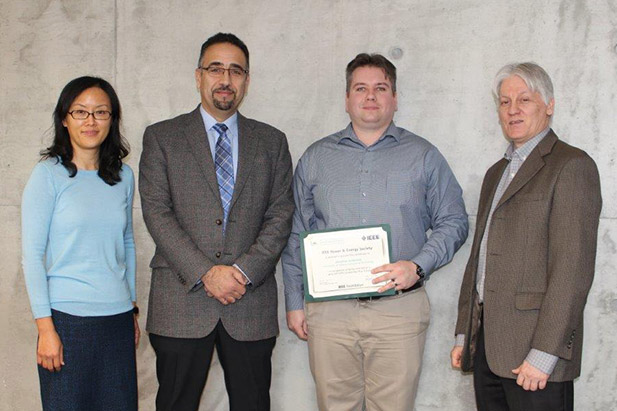Electrical Engineering student awarded prestigious international scholarship
Jonathan Anderson is first UOIT Engineering student to receive IEEE’s PES scholarship
November 10, 2016

Every student’s academic journey is full of different learning experiences. But few academic paths have seen the twists and turns taken by University of Ontario Institute of Technology Electrical Engineering student Jonathan Anderson.
Jonathan Anderson was born in Moose Jaw, Saskatchewan and grew up in a military family that was regularly on the move.
“I don't really have a hometown because we had a new home every year-and-a-half or so, until I was 18,” says Jonathan. “I went to three different high schools–two in Ottawa, and then in Kingston. Kingston is perhaps the closest thing I could call a ‘home’.”
He graduated from high school in 2002 (a full year before University of Ontario Institute of Technology was even accepting students) and enrolled in Biology at the University of Ottawa. But he admits, he wasn’t quite ready for university.
“I was immature and indifferent. I didn’t attend many lectures or labs and I missed mid-term exams. It wasn't a recipe for success and to this day I don't know why I made such poor choices.”
A few years later he tried his hand at part-time distance studies at the University of Waterloo in a three-year General Science program.
“Unfortunately it wasn’t what I had envisioned. The course structure was rigid and not accommodating for working students. My progression was very slow and I changed jobs, got married and started a family. University now came third after my family and job. Again, it was not a recipe for academic success.”
After spending five years working at Goodyear in Napanee, Ontario, and with his university program stalled, Jonathan’s parents suggested that he and his wife sell their house, move in with them and he go back to school.
“They lived in Oshawa and suggested I apply to UOIT. I honestly didn't know the university even existed. I looked into the programs they had to offer and I was drawn to the Pharmaceutical Chemistry and Electrical Engineering programs. On my birthday in 2013 I was accepted into both programs.”
He ultimately decided on Electrical Engineering. And now, in his fourth-year of study, Anderson is one of eight Canadian students awarded a Power and Energy Society (PES) Scholarship from the Institute of Electrical and Electronics Engineers (IEEE). He is the university’s first-ever Engineering student to receive the honour.
“The PES scholarship is extremely competitive and to be recognized as one of eight students in Canada for the award is extremely humbling,” says Jonathan. “I am currently considering graduate studies and this award will help me stand out to prospective supervisors and improve my chances to being accepted into a graduate program. The industry connections I have made through all of this will have a positive impact on my future career options.”
Finding out about the scholarship was a funny story.
“I had heard announcements that the recipients were already notified and I assumed I didn't receive the scholarship. On October 4, I was sent an email indicating that I was selected and actually notified on September 23. The organizers had used a mailing service to send out the notifications and it was flagged as spam.”
Anderson was recognized for his strong GPA, his distinctive extracurricular contributions to the Faculty of Engineering and Applied Science, and his commitment to exploring the power and energy field. The IEEE PES Scholarship is awarded annually to 230 students from across the United States, Canada, Puerto Rico and India.
“This scholarship is not only a recognition of my individual achievement but also a testament to the excellent quality of the Electrical Engineering program in the Faculty of Engineering and Applied Sciences.. Without the support of the faculty and all of the people that make this faculty great, I would not have been able to reach the level of success that I have experienced at UOIT. I would also like to thank the faculty’s Dr. Jing Ren and Dr. Ali Grami for their support in my application for this scholarship. Their letters of reference mean a great deal to me.”
Does Jonathan think his personal experiences hold any lessons for young students?
“Make the most of your opportunities. Many won't be as fortunate as me and have parents willing to take in a family in order to go back to school. Usually it's a one shot deal. You're never too old to go back to school, but it's a lot easier to finish when you're young and do not have debt and more complex obligations.”
As for finding his academic groove more than a decade after graduating from high school? The rewards have certainly been worth the wait.
“Applying to UOIT quickly became one of the best decisions I ever made,” says Jonathan. “I have excellent employment and graduate studies prospects and a first-class education that will serve me well in the future. Make the most of your time here. Talk to your professors–they care about you and your education. Get involved in clubs to meet people and develop those soft skills people talk about, and get educated. This university gives you all of that, you just need to go for it.”



